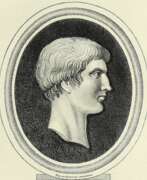1st century
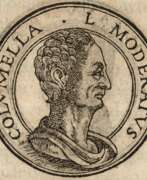

Lucius Iunius Moderatus Columella was an ancient Roman author of books on agriculture.
As a young man he was a soldier and tribune in the Roman army, but then devoted himself entirely to farming in Italy. Fully extant are De re rustica in 12 books, Columella's second and more complete study of farming and village life, and De arboribus ("On Trees"), which was part of an earlier work. Both books are written in a clear, non-academic style, the author clearly trying to instill in the reader a love of farming and the simple life.
Columella in his writings sometimes quotes from the works of Cato the Elder and Marcus Terentius Varrone, which all together provide an important source of knowledge about life at the time. The book On Farming, published in 1745, is an English translation of Columella's De re rustica and De arboribus.
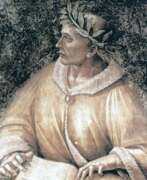

Publius Ovidius Naso, known as Ovidius (Ovid), was an ancient Roman poet who lived during the reign of Emperor Augustus.
Most of the information about the life and work of Ovid, scholars have drawn from his own works, as well as from the works of Seneca the Elder and Marcus Fabius Quintilianus. Ovid was from a fairly high class of "horsemen", studied rhetoric at the maestros of oratory of the ancient Roman Empire, and then went traveling, visiting Athens, Asia Minor and Sicily. As a young man, Ovid held minor public offices, was a member of the college of civil affairs, and served in an office that performed spiritual and secular duties at the state level.
However, Ovid was much more attracted to poetry, and he resigned and about 29-25 BC joined the circle of those chosen under the patronage of Marcus Valerius Messala Corvinus. After publishing Amores, a collection of love-erotic lyrics, around 15-16 BC, Ovid became one of Rome's most popular poets. He became famous for his works in the genre of elegy, as well as for his epic poem Metamorphoses (8 AD), which became one of the most important sources in the study of classical mythology.
For reasons unknown to us, in 8 A.D. Ovid was disgraced and exiled for the rest of his life to Tomes on the Black Sea, where he wrote his "Mournful Elegies" and a poem cycle entitled "Letters from Pontus". A contemporary of Virgil and Horace, Ovid was one of the three canonical representatives of Latin literature.
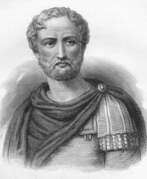

Gaius Pliny Secundus (Latin: Gaius Plinius Secundus), known as Pliny the Elder, was an ancient Roman polymath, writer and statesman.
Pliny came from a wealthy family and was educated in Rome. In military service in Germany, he rose to the rank of cavalry commander, and then returned to Rome and was appointed governor of the province. In addition to public affairs, Pliny was engaged in the study of nature, wrote various scientific works.
His book Natural History has reached our time. This is an encyclopedic work, which became an authority in Europe in scientific matters until the Middle Ages. Natural History has historical significance as one of the greatest literary monuments of classical antiquity. It is still of value to those who wish to gain an insight into first-century Rome from a primary source.
In the year 79 Pliny was appointed by Vispasian to command a fleet in the Bay of Naples, and found himself near Vesuvius at the time of its eruption. He went ashore, where he died as a result of the natural disaster.
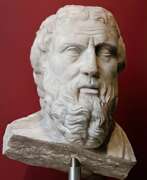

Plutarch, full Roman name Lucius Mestrius Plutarch, was an ancient Greek writer, historian and philosopher of the Roman era.
Plutarch came from a wealthy family, received a good home education, then studied in Athens with the Platonic philosopher Ammonius. In his youth he traveled a lot, twice visited Rome, where he gave public lectures, visited Alexandria, the cities of Balkan Greece. But most of his life Plutarch spent in his native Cheronea, where he was engaged in public and educational activities. At the age of about 50, he became a priest of Apollo at Delphi, as well as an honorary Athenian and Roman citizen.
Some of Plutarch's writings are devoted to various philosophical, didactic, and historical topics. These include "Moral Essays" or "Moralia", "Platonic Questions", "On Monarchy, Democracy and Oligarchy", "Instructions on State Affairs" and others. Plutarch wrote a lot of biographical works, among them "On the Fortune and Valor of Alexander the Great". The greatest popularity enjoyed "Comparative biographies", in which Plutarch recreated the images of prominent political figures of Greece and Rome. In total, 46 paired and 4 single biographies have survived.
A lot of Plutarch's publications are devoted to family and human values in general, which he considers in great detail. Plutarch's humane writings were popular during the Roman Empire, retained their importance in the Byzantine period, and with the beginning of the Renaissance became an integral part of humanistic European culture.
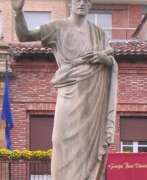

Marcus Fabius Quintilianus was a Roman educator and rhetorician born in Hispania, widely referred to in medieval schools of rhetoric and in Renaissance writing. In English translation, he is usually referred to as Quintilian, although the alternate spellings of Quintillian and Quinctilian are occasionally seen, the latter in older texts.
